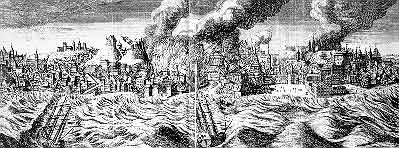
|
|
|
| History of Portuguese Literature | Origins of Portuguese Literature | The Portuguese Language | Oral Literature | Fiction | Lyricism |
| Travel Literature | Cantigas de amigo | Historiography | Doctrinal Prose | ||
| Baroque and Mannerism | Classics | Existentialism | Experimentalism | Enlightenment | Modernity |
| Neo-Realism | Post-Modernism | Realism | Romanticism | Saudosismo | Symbolism |
Enlightenment
|
|
A
movement of ideas that spread throughout the eighteenth century, based on
English philosophy and the agony of the absolutist political regime in France.
It began, above all, with the publication of the Encyclopédie,
by Diderot and D'Alembert, which gave greater importance to the notions of
nature, society, the critical spirit and progress, and was therefore to serve as
the basis for the later “modernities” of the nineteenth and twentieth
centuries.
In
Portugal, this was manifested in particular in the cultural sensitivity of the
so-called “estrangeirados” (authors
who were heavily influenced by foreign customs), in prose writers such as Luís
António Verney (Verdadeiro Método de
Estudar) and Matias Aires (Reflexões
sobre a Vaidade dos Homens), and with the “árcades” (Arcadians, e.g. the members of the “Arcádia Lusitana”, a literary academy of reflection and debate),
e.g. Correia Garção, Cruz e Silva. Important poets who were connected with the
Arcádia to a greater or lesser extent
included: Nicolau Tolentino, Filinto Elísio, Abade de Jazente; and those
already more closely connected with the emerging spirit of Romantic sensibility:
Marquesa de Alorna, José Anastácio da Cunha and Bocage.
 Evocation of the city of Lisbon after being hit by the Earthquake of 1755. Engraving from the period |
Freedom,
where are you? Who is keeping you? The
time for holy redemption has come Come
on! May you assist the cold, silent morale, May
our shackles stir your pity; Bocage, «Liberdade» |
© Instituto Camões, 2001